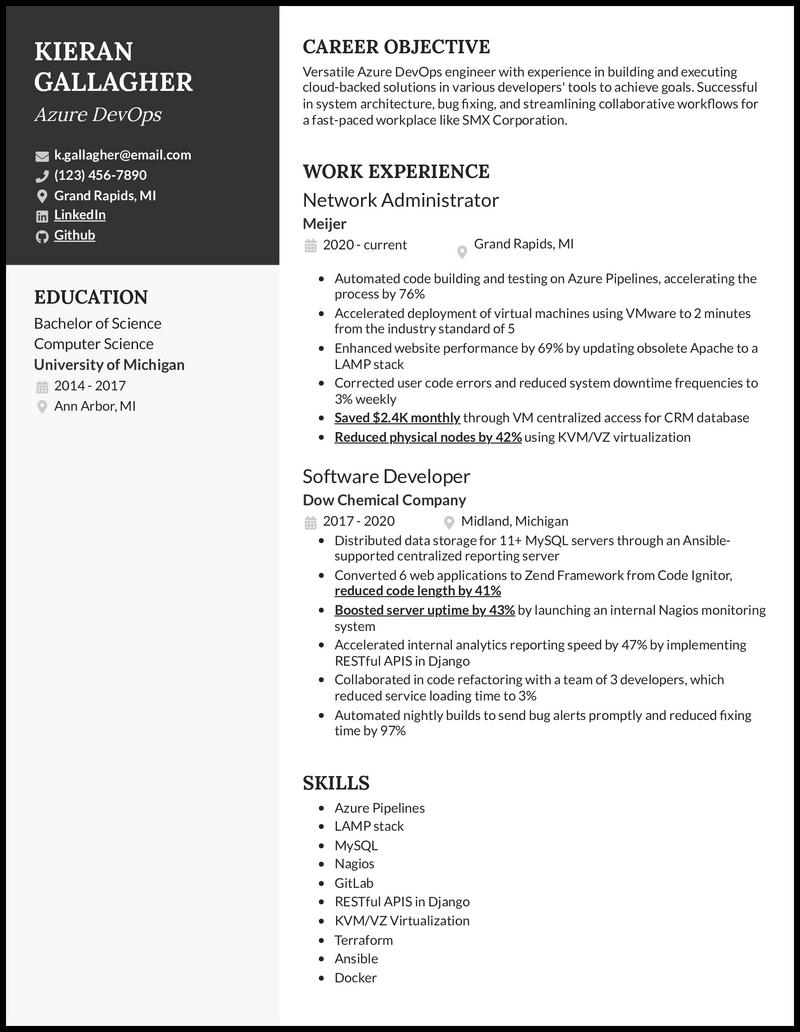As an Azure DevOps engineer, your job is essential not just on its own but as a collaborative role that keeps the entire development cycle on track. From building CI/CD pipelines to deploying applications, you have a vast knowledge of Microsoft Azure, network engineering, and programming.
Professionals like you are in high demand, so you may receive queries from recruiters on a regular basis. However, to actually land interviews, you’ll still need to make a cover letter and write a high-quality resume.
We’re here to help you with that. With our Azure DevOps resume examples and expert tips, you’ll impress hiring managers every step of the way.
Related resume examples
What Matters Most: Your Experience in Azure & Cloud Infrastructures

Seeing as your job calls for a diverse yet highly specific skill set, this part of your resume is where you can truly shine. This is the first thing recruiters look at, and this is also where any applicant tracking systems (ATS) will decide whether to say yes or no to your job application.
How to get around this? It’s simple—fill your skills section with abilities you possess that are also in the job description. Focus on software, frameworks, infrastructures, and programming languages that you know, as those are the relevant keywords for an Azure DevOps specialist.
Talk about your knowledge of Microsoft’s Azure product stack, CI/CD pipelines, infrastructure automation, and containerization, and make sure to update this section for each job.
9 most popular Azure DevOps skills
- Azure Pipelines
- GitLab
- Docker
- Kubernetes
- Jenkins
- Terraform
- Azure CLI
- PowerShell
- RESTful APIs
Sample Azure DevOps work experience bullet points
You build Azure pipelines, automate infrastructures, and improve security protocols. On top of that, you work across various departments and developer teams to streamline code deployments and improve release frequency.
Long story short: your work has a significant impact on the entire organization, and that fact is your key to crafting a successful DevOps resume. Use this part of your resume to discuss your career-defining achievements and things you’re proud of as opposed to the daily grind.
Don’t forget the power of data. Include useful metrics to emphasize and quantify your impact. This can mean things like reducing deployment or provisioning times, improving application scalability, or cutting down on system downtime.
Here are a few samples:
- Automated code building and testing on Azure Pipelines, accelerating the process by 76%
- Corrected user code errors and reduced system downtime frequencies to 3% weekly
- Implemented Kubernetes for application orchestration, resulting in a 39% boost in resource efficiency
- Migrated 50+ applications to Azure using IaC with Terraform, resulting in a 23% reduction in infrastructure costs

How to Add Certifications to Your Azure DevOps Resume
As you manage Azure pipelines and data infrastructures, you may want to emphasize specific specialties for different roles. That’s where certifications showing extra expertise in SQL or GitHub will come in handy to rise to the top in the hiring process.
When adding your certifications section, place it below your computer science education and Azure development skills sections. Each certification you list should include:
- The name of the certification, such as Microsoft Certified Azure Solutions Architect
- The organization you received it from, such as the DevOps Institute
- The date you received it
- The expiration date (when applicable)

The best certifications to put on your Azure DevOps resume
The right certifications to include will depend on the specialties you’re going for as an Azure developer. Do you want to have a security focus? Listing you’re a certified Azure security engineer could be ideal. Tailor the certifications you add to the role and company you want to work with.
Here are some top certifications for Azure DevOps resumes:
- Microsoft Certified Azure Solutions Architect: This is a good all-around certification for getting into Azure DevOps. It showcases expertise in cloud frameworks, networking, visualization, and disaster recovery.
- Microsoft Certified Azure Security Engineer: Information security is a top priority for developers, making this a standout certification to have. It’ll show you know how to protect identities, limit vulnerabilities, and manage compliance in Azure systems.
- Microsoft Certified DevOps Engineer Expert: A DevOps Engineer expert certification is an excellent choice if you’re trying to get into a leadership role. It’ll show your abilities to implement control strategies, release pipelines, and coordinate communications in Azure programs.
Some other popular certifications for Azure DevOps resumes are:
Top 5 Tips for Your Azure DevOps Resume
- Include your certifications
- Not all employers require a college degree, but many will appreciate knowing your educational background and extra certifications. The Microsoft Certified: Azure DevOps Engineer Expert and Azure Administrator Associate are staples. Certs like the Certified Kubernetes Administrator or the Docker Certified Associate are great to add, too.
- Throw in your programming skills
- If you’re familiar with any programming languages or frameworks, make sure to include them in your list of skills, be it Python or Django. You can also showcase your past work in a portfolio or your GitHub repository to give a more hands-on example.
- Keep your resume up to date
- Depending on the scope of the role, your job may be more focused on using Azure repos for hosting and collaborating on code or for using Terraform to automate infrastructures. Make sure to update your resume to match every job description to really reflect the diversity of your role.
- Emphasize collaboration
- Azure DevOps is inherently collaborative, so talk about projects that highlight that. Discuss working closely with development teams, QA, and other key stakeholders.
- Talk about cloud multi-tenancy
- If you’ve worked in hybrid cloud environments or managed multi-cloud deployments, it’s definitely worth adding to your resume. Discuss managing hybrid deployments between Azure and AWS, as well as your overall knowledge of AWS, Azure, and GCP.
Instead of listing them under skills, show your interpersonal abilities through your work experience bullet points. Talk about mentoring junior colleagues, working with programmers, or leading teams.
If you’re an experienced Azure DevOps engineer, a career summary can help you tailor your resume to match the job even more. Include a couple of key skills, and always mention the company by name.
Focus on your hands-on knowledge of Microsoft Azure, cloud infrastructures, network engineering and management, or programming. Read the job description carefully and build your resume around the key points that are relevant to your background.








